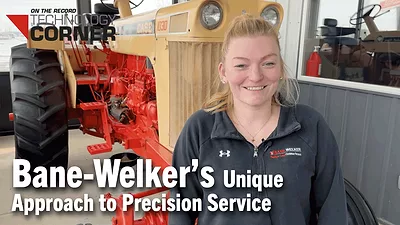While catching a glimpse of where precision farming technology is headed at the John Deere Technology Summit in Des Moines last week, at times, I felt as though I was on the set of a new science fiction movie.
The sight of a farmer monitoring weather patterns, sprayer application and machine telemetry on a computerized wall in his home — all while calmly sipping his morning coffee — was both eerie and engaging.
The scenario was purely hypothetical and that type of technology is not yet ready for public consumption.
But I doubt if it is as far off in the future as some may suspect, meaning those who deal in precision equipment will undoubtedly be challenged to evolve as quickly as the technology they sell.
On several occasions during the Deere event, presenters pointedly talked about the critical role of dealerships in providing customer solutions and support as the next wave of precision products hit the market.
Some of the technology is already here and simply being adapted in areas of the farming industry where it was unheard of, even a year ago.
In the July/August issue of Farm Equipment, I look at the recent emergence of precision technology in the hay and forage segment of the industry to include GPS navigation on windrowers and balers.
Industry experts say the use of technology will continue to trickle down and expand from the planting side to harvesting in short order.
Further out, the topic of autonomous tractor operation was broached during the Deere event along with enhanced robotics in precision farming.
And Deere recently unrolled a handful of new precision products and gadgets showcased at its event – from a centralized web portal to manage field operations, to a real-time weather sensor that can chart humidity and wind speed.
As manufacturers push the envelope with farm technology, precision ag specialists need to be mindful of their role in the equation, especially as a link to customers who have zero experience with precision farming.
As someone in charge of delivering the end results to customers and instilling in them the confidence to operate the technology, veteran precision ag specialist Rodney Bratthauer, of Kunau Implement in DeWitt, Iowa, says the first step is putting customers at ease.
“The most common quote I hear is, ‘I wasn’t born with computers and I know nothing about them,’” Bratthauer says. “They always think it’s a computer, so once you get over that hurdle, you’ve made a large step.”
Kunau’s DeWitt showroom features a variety of Trimble auto-guidance systems and Bratthauer acknowledges that, compared to standard equipment, they can be intimidating for customers.
His approach to breaking down that initial barrier is to give hesitant customers a demonstration and then personalize the appropriate technology to fit the needs of the buyer.
“People just want to know where to start,” Bratthauer says. “Once I show them that it’s really just the touch of a few buttons, they are able to adapt. It doesn’t take a four-year degree to be able to operate this stuff.”
Bratthauer has 12 years of formal and informal education invested in precision technology and he says understanding how to use it isn’t “rocket science.”
But those developing the technology are using cutting-edge engineering and agronomic techniques, never before seen in the industry.
In some cases, the future is vague.
Prior to a presentation at the Deere event, I asked a product manager what we were about to see. His answer was simply, "innovation."
But what is clear is that precision farming specialists will be an evolving bridge between the manufacturer and customer.
While the future of precision farming is rapidly approaching, dealers also have to acknowledge the past, in order to successfully bring customers into the present.






